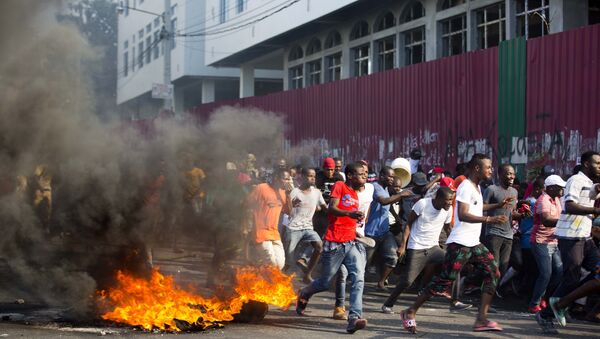Protests in Haiti have been raging since September because of fuel shortages, with the opposition movement gaining momentum since Moïse emerged victorious from the 2017 presidential election. Opponents of the president have demanded his resignation and accused him of embezzling funds from PetroCaribe, an oil alliance founded in 2005 and involving 18 Caribbean member states and Venezuela in which Venezuela provides alliance members oil supplies based on a concessionary financial agreement.
“I think if we’d seen [former US Presidents] Barack Obama or [Bill] Clinton or even [George] Bush in power, they would have seen to it that Jovenel Moïse was replaced quite a while ago. But he is clinging to power, refusing to step down. The Trump administration, I think, is only interested in keeping them there so they can continue to vote with the US against Venezuela” and Bolivia in the Organization of American States, Ives told host Sean Blackmon on Friday.
“They have basically got Jovenel … as their puppet … so they [the US] are keeping [him] there, but I think it is foolish, in a sense,” he noted.
Ives explained that the protests are “creating a revolutionary situation where people are saying, ‘We don’t just need a change in government. We need a change in system.’”
According to Ives, there has been support for the Haitian protests across the world.
“The diaspora … is very much overwhelming in support of the mobilization. They are doing solidarity marches here. There have been marches in Montreal, marches in Miami, and here in New York, there have been two or three … Of course, with social media, with WhatsApp, with all these new technologies, the long time divide that used to exist between the diaspora in North America and Europe and what’s going on in Haiti has basically evaporated. The diaspora is very much involved and very much a part of this new movement,” Ives explained.
The US also continues to use Moïse as a way to further its interests in Venezuela, Ives explained. Ties between Venezuela and Haiti have long existed but increased in 2008 when Caracas began providing petroleum products to Haiti via PetroCaribe. Under that agreement, Haiti was also required to pay 60% of the price upfront for the Venezuelan oil, with the rest of the cost being deferred. Haiti could then sell the oil, with the funds going into the PetroCaribe fund to be used to pay for social welfare projects in Haiti.
However, former US-backed Haitian President Michel Martelly embezzled around $4.3 billion from the PetroCaribe fund. According to a report by Liberation News, some believe Martelly used some of those funds to ensure Moïse gained power in Haiti in 2017.
“The PetroCaribe alliance in Haiti is very much a part of what is going on today. That is, in 2008, when the oil from Venezuela began flowing into Haiti, it really, I could say, postponed this explosion that we’re seeing happening today … Haiti was receiving 20,000 barrels of oil a day. It was selling it, and it was keeping 40% of those revenues in a fund called the PetroCaribe fund, which ended up becoming $2 billion which were completely squandered by the regime - principally, by the Michel Martelly regime.”
“That all came to an end in 2018, mostly due to the sanctions that [US] President [Donald] Trump put on Venezuela. But this year, in the first semester, according to [Venezuelan President] Nicolas Maduro, they [Venezuela] are going to be launching the alliance but not with countries that they are at war with. Haiti is clearly at war with Venezuela. They are doing everything the US asks of it in terms of voting against Venezuela, recognizing the fake president Juan Guaido and his ambassadors,” Moïse explained.

